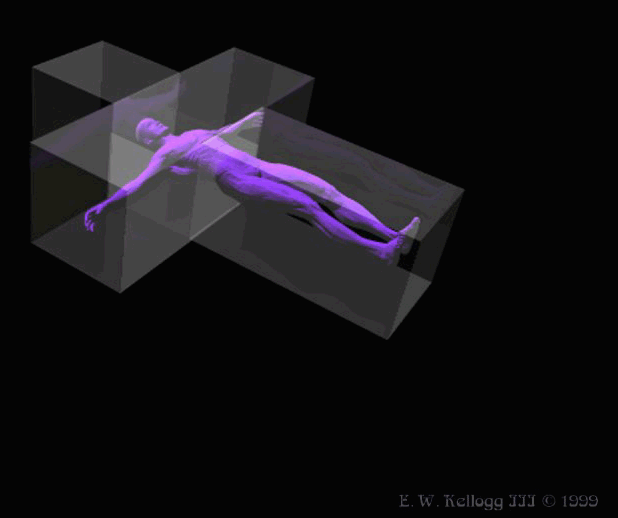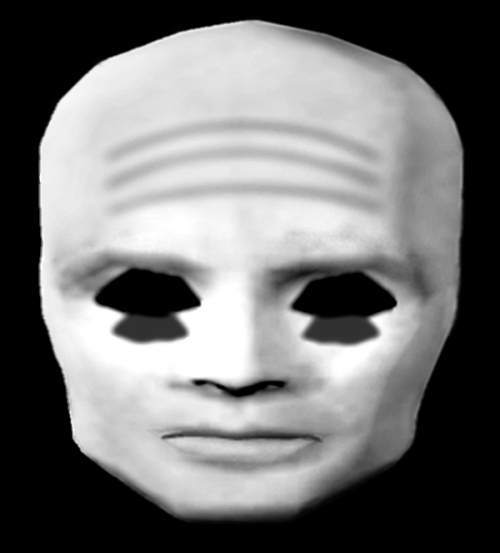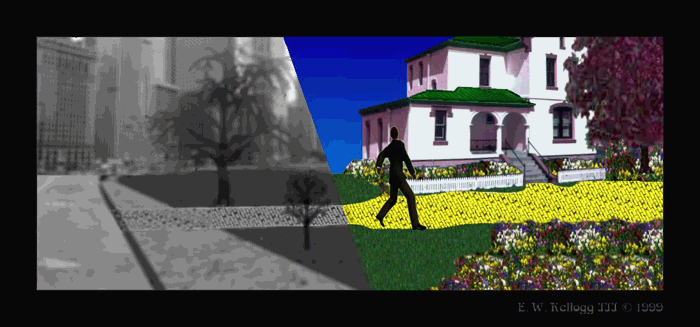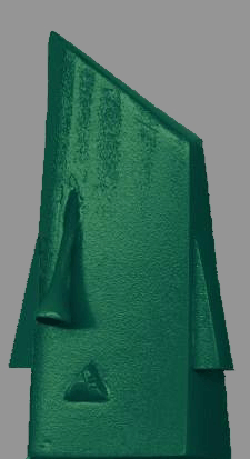1. "Kabbalistic Cross"

My lucid dreaming group had spent the week before my dream exploring
the sefirah Binah ('Binah' means 'understanding' in Hebrew), an energy center on
the Kabbalistic Tree of Life. "The Tree" can serve as a metaphorical model of
one one's own consciousness, or of the Universe, depending on how one works with
it.) Aside from recommending certain keys to participants to access the sefirah
in lucid dreams, I also routinely recommended that group members do an ordinary
dream incubation to get a feel, in their own symbology, as to the meaning of
their lucid dreaming destination. When I did this myself, I had the following
dream:
EWK 2/15/1998, (prelucid)
"... I design / look at a 3-Dimensional cross, that somehow has 32
corners on it. I realize that Binah = the Cross, the form of the Cross, the
Cross itself, the restrictions, laws, and limits of matter. (mater!). I design a
human figure to go in the cross, an androgynous but masculine figure of a deep
purple color. I push buttons that highlight the brain and other organs,
corresponding to the corners. I realize that Binah = the matrix = the coordinate
system for the Universe."
As a way of essentializing my insights from this
dream, I composed the following Haiku poem:
Thirty-two
Corners
Make the Cross of the Mother.
In the Matrix: Man
This
graphic - my first computer art dreamscape - shows what I saw in the dream,
almost exactly - an androgenous man inside a transparent energy cross floating
in the depths of space.
2. "Judge of Judges"

A week after my "Kabbalistic Cross" experience, I encountered my own
"Judge of Judges" aspect-Self while experimenting with a particular Hebrew chant
(which translated means "Wisdom-God"), as a means of accessing the sefirah
Da'ath (meaning "knowing") on the Tree of Life. This dreamscape graphic does a
very good job in portraying what I saw in the dream mirror. Incidentally, when I
made up a costume based on this image for the 2001 ASD Conference in Santa Cruz,
it won the "best costume" award.
EWK 2/22/98 (fully lucid)
". . . in a dream analogue of the Westport living room, lucid I decide
to take advantage of the mirror to try my task. I chant: chok /mah ell /oh /
heem. My face begins to shift and change, growing huge and monstrous - very
severe looking. Like a combination of the Wizard of Oz and the Face on Mars. A
white massive head floating above my body, detached, large black eyes with black
eye-like hollows below them. I wonder how I could describe this to the lucid
dream group. It looks inhuman and powerful - a Judge of Judges. . . . "
"Yellow Brick Road"

I had this dream in an 8 week lucid dream group, during the week in
which I assigned the group the task of reconnecting with the magical child
within. This dream actually began a series about "Oz", which reiterated the
message - in marked contrast to the opinion of Thomas Wolfe - that "you can go
home again" .. at least in your dreams!
EWK 2/11/99 (not lucid)
"In a city like Chicago, I visit with my true love, a wonderful old
woman 80 - 90 years old, standing barely 5 ft tall but as charming as Katherine
Hepburn and still active and full of life. I have only lived 35 years or so, and
look strikingly different. I wear the body of a tall thin man, almost 7 ft.
tall, with skin so dark that it almost looks purple. I have loved the spirit of
this woman since I first saw her and she has loved mine, but it would seem hard
to find a pair or more mismatched lovers. Although we will never have a physical
relationship in this life, we have become fast friends since our first meeting.
I make a sad and strange figure, melancholy in temperament and grave in
appearance, with an odd foreign accent in my speech. As soul mates we enjoy the
rarest of privileges by getting to meet in the same life, but we did so in
tragically mismatched incarnations. She feels much more at peace with this
situation than I, and even feels genuinely cheerful much of the time. With a
wise look in her eyes, she says to me: "For your soul's solace you need to walk
the yellow brick road". "Uh huh." I reply, "and where would I find it?". She
points to a grey stone driveway, down the city street from her cottage. It looks
unremarkable to me, a grey driveway like so many others. Nevertheless, I walk
down the sidewalk to the driveway, and upon looking at it closely, I see that it
gets made up of bricks covered over with grey dirt and grime, but that when I
scrape below the dirt I see a glint of yellow - the yellow brick road. She tells
me that only a very special few can see this road, and that to mundane eyes, it
might as well not exist. Taking her advice I follow it, even though it only
appears to extend 30 ft or so, into someone's backyard. However, after walking a
mere 20 ft or so I find myself suddenly in Oz - a bright land of brilliant
colors, the yellow brick road now truly yellow, the air smelling clean and fresh
like nectar. When I look behind me I can still see the city street and cars, but
muted and grey. Looking forward again, I see an inn on my left. Inside I find a
cheerful middle aged woman, who greets me. Her Inn on the border serves weary
travelers arriving from the mundane world; a place where they can heal and
regenerate their souls for a few days before traveling further into Oz. The Inn
feels healing and comforting to me, and I check into a room ...."
4. The Shin Tapestry

One of the participants in my lucid dreaming group, R., who also
worked with me on a Tree of Life Garden project, suggested that I might want to
see what I could come up with, using lucid dreaming in respect to the upper
horizontal path of the garden design, a path that corresponds to the Hebrew
Letter shin, and the element Fire.
EWK 1/26/01 (fully lucid)
"I remember R.'s request and chant: "Shin! The Tree of Life Garden!" ...
As I chant I feel drawn off and whisked away into the air. As I travel, I feel
close to awakening, so I use a kinesthetic technique (rubbing my dream hands
together ) to keep my focus and to stay in the dream while in transit. I arrive
in a long open airy room, with wooden walls and floor, to find myself on top of
a tapestry, perhaps 6' X 24', made up of a repeating design of rectangles,
mostly in red, but some in yellow and blue. Each rectangle seems about 1' X 1.5'
in size. Each had a design of two light grey pillars on the outside, and an odd
shape, sort of like a phaser on a pedestal in the middle. I don't recognize the
middle object as anything in particular, so I just try to memorize its shape so
I can reproduce it later. ..."
After physically waking up, I duplicated the
design as best I could using my Painter program - I feel I succeeded in doing so
with 90 -95% accuracy. Incidentally, the middle object, which I could not
recognize in the dream, pretty obviously corresponded to an anvil when I looked
at the shape later.
5. "She"

(painted wood, measures 5"H X 3"W X 1.5" D)
I had this dream during a lucid dreaming group that focused on trying
to pay attention to the structural level dreams, and where I made an attempt -
at least while lucid - to refrain from imposing my expectations and
preconceptions on dream phenomena.
EWK 2/22/99, (lucid)
".... I descend from a rocky mountain top down a spiral staircase after
a successful dream quest while lucid) ... "I continue on and meet an amiable
older man, husky but rounded in appearance, with sparse white hair. He asks me
how my quest went. I tell him that it went well, and that I succeeded. He asks
if he can see what I obtained. I reach into my right coat pocket, and take out a
small object, perhaps 5" long, rolled/wrapped in a long piece of paper. I decide
to show it to him and feel glad that he asked to see it, as I have not looked at
it yet myself, and I expect it to disappear when I return to waking physical
reality. I unroll it and hold a bright green carved wooden object in my hand. It
looks like nothing I expected - irregularly shaped with a triangular theme,
asymmetric and not at all humanoid with some odd protuberances. I look at it
from a variety of angles, trying to simply see it and to memorize its shape. I
pass the object to the man, who holds it in the palm of his large left hand.
"She looks very impressive!" he says, admiring the artifact. "She?" I wonder. I
certainly never would have categorized it as feminine myself, but now I feel a
sort of feminine energy associated with it."
Ed Kellogg's Artist's Statement:
(see also Ed's Bio Page,)
Over the years improvements and innovations in computer graphic art
software has made it much easier to effectively and accurately reproduce the
inner landscapes of dreams. The 'dreamscapes' presented here capture scenes from
my dreams with about 90% (+/- ) fidelity. To create these dreamscapes I used
Bryce 3D, Poser3D, and Painter 5. I also make use of a file collection of Master
Clips images. Computer art definitely requires an integration of the right and
left brain - the right to see the final vision - and the left - to understand
the complex and sometimes counterintuitive instructions on how to use the
computer programs to create the effects that one needs to get there! As I see
it, computer art (at least as I do it) requires skills and techniques from at
least four artistic disciplines:
1. Sculpture - when the artist creates or
customizes 3d images;
2. Photography - where the artist arranges 3d images,
camera angles, and lighting to get the effect desired;
3. Collage - where
the artist integrates different elements together in a two dimensional
framework; and
4. Painting - where the artist works in all of the special
effects, make final modifications to colors, background textures and special
effects.
All of these serve as modalities through which I can create a
graphic that matches what I have in mind. In the case of recreating one of my
own dreamscapes, I pick a scene from memory that appeals to me - one particular
snapshot, so to speak, of the dreamed experience that captures its essence for
me - and reproduce it with as much fidelity as possible. As these software
programs continue to develop and improve, it will become easier and easier for
dreamers without highly developed artistic skills to create quickly and easily
"pictures worth a thousand words". No matter how detailed, a dream report
consists only of a pattern of words, that at best still fails adequately convey
the living reality of the dream as experienced. In my experience, computer
software graphics programs can serve as a connecting bridge, through the use of
which one can recreate dreamscapes that can convey the living reality of a dream
to someone other than the dreamer.
Back to the 2002 Index




